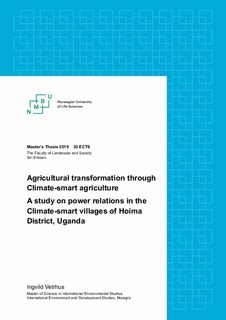Agricultural transformation through Climate-smart agriculture : a study on power relations in the climate-smart villages of Hoima District, Uganda
Master thesis
Permanent lenke
http://hdl.handle.net/11250/2597284Utgivelsesdato
2019Metadata
Vis full innførselSamlinger
Sammendrag
Adaptation in a technical form and meaning is no longer enough if world populations are to be able to live with, reduce and withstand the impacts of climate change (Pelling, 2011). Various approaches to adaptation, such as Climate-smart agriculture (CSA) initiatives, are increasingly promoted as a solution to climate change for farming communities. They intend to both strengthen resilience and reduce emissions from agricultural activities, as well as enable poor households to manage climatic variability and change (Khatri-Chhetria, et al. 2017). Some scholars view CSA as a tool for agricultural transformation that promote equitable approaches in the face of climate change. However, it remains unclear whether CSA initiatives address the root causes of vulnerability to climate change, such as the link between power, vulnerability, inequality, and inequity – the interrelated factors that make people vulnerable to climate change in the first place (Karlsson, et al. 2017). This study investigates how CSA can open up or close down spaces for agricultural transformation towards equitable approaches to climate change, and addresses CSA through three spheres of transformation. These include the personal (worldviews, values) the political (policy and governance) and the practical sphere (measurable or observable adaptation outcomes on the ground) (O’Brien og Sygna 2013). The concept of subjectivities is then used as an analytical tool, or as a lense, to explore how the values and worldviews that underlie the socio-political relations in the case of a Climate-smart agriculture (CSA) project in Hoima District, western Uganda, interacts across the spheres. This study explores the social reality of CSA stakeholders and the local population, including members and non-members of the project, project staff and authorities, to gain empirical insight to how their worldviews, values shape power relations in and around the CSA project. Lessons drawn from the examination of this case study aimsto add to our understanding of the ways in which transformation may be supported or undermined through climate interventions, and provide an example of how power relations can open up or close down spaces for agricultural transformation in a smallholder farming community. Findings suggest that the power relations in and around the CSA project in Hoima risk reinforcing an expert-hierarchy, where subjectivities deriving from worldviews and values cast small-scale farmers, especially women, in passive roles as receivers. Without contestation, these subjectivities risk closing down spaces for transformation.

